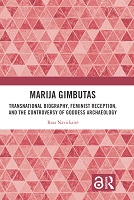Chapter 5 Searching for Old Europe
Proposal review
Marija Gimbutas and the Problem of Cultural Appropriation in Feminist Spirituality
Abstract
This chapter describes the development of radical/cultural feminist ideas in the U.S. and the rise of the Goddess movement, focusing on the importance that the movement placed on narratives of prehistory. It positions Gimbutas’ works on Old Europe at the cultural moment of women’s liberation in the U.S., and shows the effect that they had on feminist audiences in the 1970s and the 1980s. The chapter discusses the relationship between the Goddess movement and Gimbutas, demonstrating that by the late 1980s Gimbutas was familiar with radical feminist views. The chapter focuses on the construction of an image of Eastern Europe and other European margins in Gimbutas’ work and the narrative of victimization by the Soviet Union and modernity in general. It shows how the Eastern European Lithuania folk traditions became an attractive source of spirituality for the Goddess movement, as it could be seen as European, and a part of Western cultural heritage, without the guilt of colonialism and imperialism. The chapter instead proposes to consider the history of nationalism and the idealization of the peasant culture in Eastern Europe and to interpret Gimbutas’ Old Europe as a negotiation of European belonging by marginalized Eastern European nations.
Book
Marija GimbutasKeywords
Marija Gimbutas, gender studies, archaeology, prehistoric archaeology, feminismDOI
10.4324/9781003215592-7ISBN
9781032104898, 9781032104904, 9781003215592Publisher
Taylor & FrancisPublisher website
https://taylorandfrancis.com/Publication date and place
2023Grantor
Imprint
RoutledgePages
36Public remark
Funder name: AABS, University of WashingtonMetrics
Measures
Timeline
Geographical
Information


 Download
Download